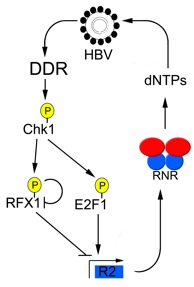- Molecular basis of virus-host cell interactions
- Hepatitis B virus as a metabolovirus
- Viruses and oncogenesis
- Synthetic viruses
Molecular basis of virus-host cell interactions
Our laboratory studies Hepatitis B Virus (HBV), a widespread human pathogen with over 400 million chronically infected individuals. The HBV genome is small - only 3.2 kb - and encodes 4 open reading frames. Despite its small size, HBV succeeds in manipulating the cellular environment to suit its needs. Our lab studies the molecular mechanisms involved in these virus-host cell interactions. We study the molecular mechanisms of HBV gene expression and investigate how the virus hijacks the cellular transcription machinery. HBV gene expression exemplifies the principle of “post receptor tropism” of the virus. In addition we identified the cellular RNR enzyme as a main target of the virus. This enzyme supplies the dNTPs that are consumed by the virus for genome replication.
Hepatitis B virus as a metabolovirus
We found that HBV behaves like a metabolic gene and therefore coined the term metabolovirus. The important roles that metabolism plays in the life cycle of the virus was by large overlooked, and was not considered as a major factor in viral infection and diseases progression. We would like to change this picture by highlighting this important aspect in virology research in general. We also have good reasons to think that understanding of this new discipline in virology has clinical and therapeutic significance. For example, we have demonstrated in mice that starvation increases HBV expression therefore conditions of short-term food deprivation should be completely avoided in HBV-infected individuals. Thus, proper nutrition including the digestion of complex carbohydrates to avoid hypoglycemia that might result in the initiation of gluconeogenesis, may be a critical ingredient of anti-HBV therapy strategy. This finding set the stage for the possibility of “nutritional therapy”.
Viruses and oncogenesis
It is well known that chronic infection of HBV often leads to the development of hepatocellular carcinoma (HCC). In contrast to DNA tumor viruses that induce the cell cycle and inhibit tumor suppressors, which leads to cell transformation, HBV does not induce cell proliferation, and the molecular mechanisms behind HBV-induced tumorigenesis are not entirely clear and under study.
Our laboratory also studies the Polyoma middle T tumor antigen (PyMT), which by itself is capable of inducing tumors in cells and animal models. We have discovered that PyMT subverts a cellular tumor suppressor pathway, the Hippo pathway, to support cell transformation. We are studying the players and molecular mechanisms involved in this non-conventional use of cellular factors by a viral oncoprotein.
Synthetic viruses
We are developing the idea of generating a virus like particle by assembling its different components in vitro. To this end we separately produced the different viral components. We developed protocols to incorporate into these “synthetic” particles macromolecules of interest. It is our hope that such an approach will be used for safer gene therapy.



